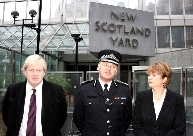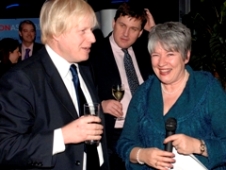Contents
This page contains issues of the MPA Direct January 2009 issue.
Warning: This is archived material and may be out of date. The Metropolitan Police Authority has been replaced by the Mayor's Office for Policing and Crime (MOPC).
See the MOPC website for further information.
MPA Direct - January 2009
Issue 3
This issue of MPA Direct is available as PDF document. Or alternatively a summary version is available below.
MPA: welcomes appointment of Sir Paul Stephenson as new Commissioner
Sir Paul Stephenson was appointed the new Commissioner of the Metropolitan Police on Monday 2 February 2009. On behalf of the MPA Vice Chair Kit Malthouse responded:
“In Sir Paul Stephenson we have a new Commissioner with an impressive record of tackling crime, successfully leading a large police force and working to improve the relationship between the police and the public.
“On behalf of all the Members of the Metropolitan Police Authority I congratulate Sir Paul on his thoroughly deserved appointment as Commissioner of the Metropolitan Police. We are delighted that HM The Queen and the Home Secretary endorsed our recommendation and the representations from Boris Johnson in his capacity as Mayor of London.
“The calibre of all the applicants was outstanding.”
 Sir Paul Stephenson: biographical
details
Sir Paul Stephenson: biographical
details
Sir Paul was awarded the Queen's Policing Medal for services to policing in May 2000 and received a knighthood in the Queen's Birthday
Honours list last June.
He joined the Lancashire Constabulary in 1975 and worked his way up the ranks to Divisional Commander (Supt) in 1994, when he moved to Merseyside Police as Assistant Chief Constable. Here he targeted organised crime, related gun violence, street disorder and police corruption. He also commanded the Grand National which was then subject to repeated terrorist threats. He remained in post until September 1999, when he returned to Lancashire police as Deputy Chief Constable. He implemented the ‘problem orientated policing’ model, and led the service’s response to the Stephen Lawrence Inquiry Report.
Sir Paul progressed to Chief Constable of Lancashire Constabulary in July 2002, when he embedded changes in the service which remain today and continue to sustain Lancashire Constabulary’s standards of excellence.
He instigated service programmes to reverse declining confidence following police contact and delivered policing to communities through a network of dedicated beat managers, PCSOs and volunteers. He also reduced stopsearch disproportionality and achieved minority ethnic recruitment targets.
In March 2005 Sir Paul moved to the Met as Deputy Commissioner where he has been committed to organisational improvement. Since December 2008 he has been Acting Commissioner.
Annual Audit Commission letter to MPA Members to 31 March 2008
The Audit Commission's Letter provides an overall summary of their assessment of the Authority, based on audit work performed in relation to the accounting period ending 31 March 2008. The Letter was presented by the Audit Commission at the MPA Corporate Governance Committee in December 2008 and copies provided to all Authority Members.
The Letter is also intended to communicate the significant issues to key external stakeholders, including members of the public. In addition to being published in full on the MPA website, the Letter is also published on the Audit Commission website at: www.audit-commission.gov.uk
Summary: key messages
- We (Audit Commission) issued an unqualified opinion on the Metropolitan Police Authority's (MPA) 2007/08 accounts and those of the pension fund on 29 September 2008. Arrangements to support the production of the accounts continue to improve and were of a good standard this year.
- We issued an unqualified value for money conclusion on 29 September 2008, concluding that the Authority had proper arrangements in place to secure economy, efficiency and effectiveness in its use of resources.
- We continue to assess the Authority's use of resources overall as achieving adequate performance. Our view is that the underlying direction of travel is positive and arrangements are developing
and are generally stronger than a year ago. For the first time, no sub-theme was assessed as below minimum requirements. However, whilst improvements are being made, more is needed to properly embed
governance arrangements that are fit for purpose across the MPA and the Metropolitan
Police Service (MPS). - Notable achievements during the year include a continued reduction in crime, the implementation of Safer Neighbourhood teams and the development and rolling out of the joint community engagement
strategy. Performance management is
an improving area with a robust set of corporate health indicators developed during the year. The Authority recognises a need for a sharper focus on the outcomes being achieved from policing activities and the impact policing is having on public perceptions, and is working to achieve this. While crime data quality met the minimum standards, little improvement was evident during 2007/08, a situation which the MPS is currently addressing. - The financial position at 31 March 2008 was strong, and since then the necessity of maintaining a prudent reserves position has been underlined by the Authority's exposure to the instability in
the banking sector, with £30 million at risk with an Icelandic bank. This matter, set alongside the considerable challenges of delivering savings against a demanding efficiency
agenda, the uncertainties in police grant funding levels and the financial implications of preparing for the Olympic Games, emphasises the continuing need to keep the medium term financial and reserves positions under ongoing review.
Recommendations
- keep the Authority's financial position and the strength of reserves under review, particularly with regard to present and future financial risks;
- improve the system of internal control and compliance with financial regulations, both centrally and throughout the MPS;
- integrate business and financial planning, including the embedding of risk management in planning processes:
- further integrate cost and performance data and use this to drive budget setting and monitoring processes; and
- continue to improve arrangements for securing value for money, in particular by understanding the impact of external factors on costs and the difference between the MPS's costs and those of other large forces.
Go Wisely Stop and Search DVD—update
 For many people, being stopped and searched by a police officer will be
their first encounter with the police so its crucial that officers are professional and respectful when they use the tactic. The public also need to understand why the police use this tool, as well
as what their rights are during a stop and search procedure. The ‘Go Wisely – everything you need to know about Stop and Search’ DVD is intended to:
For many people, being stopped and searched by a police officer will be
their first encounter with the police so its crucial that officers are professional and respectful when they use the tactic. The public also need to understand why the police use this tool, as well
as what their rights are during a stop and search procedure. The ‘Go Wisely – everything you need to know about Stop and Search’ DVD is intended to:
- explore what stop and search is for and why it’s controversial;
- inform the public of their rights when they are stopped or searched; and
- be part of an overall training package for the police on how to use stop and search appropriately.
Nearly 2,000 ‘Go Wisely’ Stop and Search DVDs have now been distributed across London and nationally since it was launched at the MPA
‘Stop Right Now, Thank You Very Much’ conference on the 21 June last year. Requests for the DVD have come from within the Met, independent youth organisations, academic institutions and
community groups.
Twenty five Stop and Search Community Monitoring groups have requested the DVD, while Camden, Ealing and Hounslow have distributed
copies to Safer Neighbourhood Teams, schools liaison officers, youth offending teams and partnership units. Future plans include distributing copies to all CPEGs across London. London-based
organisations such as the Safer London Foundation, the Youth Independent Advisory Group, the Young Black Police Association and colleges and, further afield, Coventry University and Wiltshire and
Norfolk police, have all received copies.
Now recognised across London and nationally as an effective training guide to the use of stop and search, its value was summed up by one youth trainer as follows: “Hardly anyone including young people will dispute that stop and search is necessary! The problem lies in the application of this power. By highlighting the good and bad ways to stop and search young people the DVD creates a learning tool not just for young people but for adults and police officers as well.“
You can order a copy of the DVD from the MPA Engagement and Partnership Unit by calling 020 7202 0233 or watch the DVD on the MPA
website.
Met Volunteer awards evening

Obviously the venue wasn’t big enough to enable all the volunteers to get together, so the longest serving volunteers were invited along to celebrate. MPA member Jennette Arnold, in her capacity of Chair of the London Assembly welcomed all the guests, who included volunteers, borough commanders, police officers involved in the MVP and MPA members. Mayor Boris Johnson, in his capacity as MPA chair, earned thunderous applause with his rousing address which celebrated the volunteers’ dedication and hard work.
Commissioner Sir Paul Stephenson (Acting commissioner as he was then) followed and stressed how important and integral the volunteers are in the fight against crime. In response to the Mayor’s suggestion that next time a night club should be hired to accommodate all of the 1,400+ volunteers, Sir Paul admitted it would be the first time he would have set foot in one for many a year. An award was presented to each of the three boroughs where Met volunteers had given the greatest number of hours over the past year: Bexley, Bromley and Hillingdon. Some of the longest serving volunteers from each of these boroughs received the award on behalf of their borough colleagues. Sue Rich, founder and head of the MVP (pictured with MPA Chairman Boris Johnson and Vice Chairman Kit Malthouse), was the evening’s compere and made sure everything ran smoothly.
Project Herald: the Met's new custody suite policy rolls out
The Met is moving ahead with the London-wide rollout of Project Herald, the civilianisation of custody suite posts intended to release police officers for front line duties, and which includes the provision of nurses in custody suites.
As part of this policy, the Met has changed its contract with Force Medical Examiners (FMEs). This means FMEs will be operating on an ‘on duty’ basis rather than the previous ‘call out’ basis. The Met’s aim in making these new arrangements for is to deliver improvements in the timeliness of medical care to detainees and ensure value for money. This view is supported by other forces across the UK which have already introduced the system.
FMEs and their representatives (from the Society of Forensic Physicians) were consulted and a substantial number have signed the new contract.
Contingency arrangements are in place with other FME services to ensure minimal disruption to services and a 24/7 helpdesk is in operation to help and advise custody staff through this transitional period. Borough Commanders are also fully aware of the changes and have been advised of arrangements for cover.
The MPA is asking all Independent Custody Visitors (ICVs) - members of the local community appointed to make sure that the welfare of people detained in police stations is maintained - to observe any problems relating to medical care to detainees during this transition, and has advised them to raise this locally at the time of their visit and record their concerns on the visit report form.
Keep right up to date:
Sign up to our News Feeds to be alerted when a new committee agenda or press release is added to the MPA website: www.mpa.gov.uk/news/rss.htm
And finally…..we would appreciate your feedback on MPA Direct. Please contact us by email at communications@mpa.gov.uk or telephone 020 7202 0216.
Supporting material
Send an e-mail linking to this page
Feedback